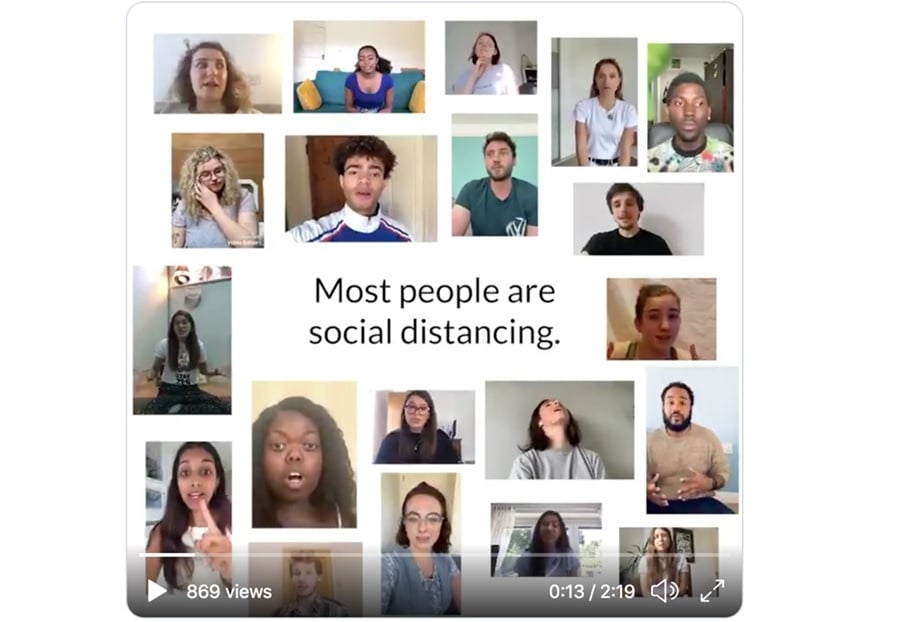The Public Engagement team followed up with Research Fellow, Rebecca Meiksin, to find out about her COVID-19 Public Engagement project.
Project Lead: Rebecca Meiksin, Research Fellow, PHP
LSHTM Project Team: Shari Krishnaratne, Research fellow, ITD and Chris Bonell, Professor of Public Health Sociology, PHP
In the UK, survey research carried out between 1 and 3 April 2020 in the first few weeks of the UK lockdown due to the coronavirus pandemic demonstrated high levels of understanding and support for the government's measures. However, some of the public were already struggling under lockdown measures, with younger people more likely to find it difficult: 42% of 16-24s were already finding it extremely difficult or expected to in the next four weeks.
Together in Spirit’s aim was to increase young people’s motivation and self-efficacy for adherence to social distancing measures. We invited UK residents aged 16-24 to submit short, self-shot videos in which they shared the challenges they were facing, coping strategies they were using and what motivated them to adhere to social distancing measures. In partnership with Brickwall, a London-based creative agency, we then curated this user-generated-content into a video montage which was shared across social media.
Project aim
To support the motivation and self-efficacy of young people in the UK for complying with social distancing measures required to control the spread of the novel coronavirus.
|
The basics |
By the numbers |
|---|---|
|
Who: UK residents aged 15-29 |
Development time: Apr – May 2020 |
|
What: Support young people in the UK through |
Project duration: Apr – May 2020 |
|
When: Apr – May 2020 |
No. of participants: 23 |
|
How: Online videos and social media |
LSHTM staff involved: 3 |
| Funder: LSHTM COVID-19 Response Fund |
Other professional staff: 6 |
The project
Together in Spirit invited individuals between the ages of 15-27, living in the UK to share their story of lockdown to tell young people’s experiences of social distancing and help keep spirits up. Individuals were asked to film a short video of themselves answering three questions around what they were finding challenging; what they were doing to make this time more bearable; and their reasons for following social distancing guidelines. The final film incorporated a broad range of experiences from young people, showing a sense of togetherness to motivate others to comply with social distancing practices required to control the spread of COVID-19.
As of 16 July 2020, the final video had 38,354 Twitter impressions (1,250 engagements), 128,639 Instagram/Facebook impressions (7,079 engagements), and 3,623 LinkedIn impressions (62 engagements). Impressions refer to the number of times a post is displayed, and engagements represent the number of interactions with posts via likes, comments, retweets, shares, saves, etc.
Major planning and development tasks
Call for submissions: Brickwall created assets to promote the call for submissions via social media and set up a website to collect video submissions. We found strategically targeting individuals and organisations that work with young people or in public health in the UK was more effective in generating submissions rather than paid advertising via social media.
Developing messaging: We worked collaboratively with Brickwall to identify key principles to frame the messaging of the final video. Drawing on social and behavioural social science approaches, the video aimed to build on positive social norms and show widespread adherence to social distancing measures, communicated via user-generated content promoting messages of standing together and protecting each other. The video received positive feedback from many that it felt powerful and moving to watch.
While we came up with the three prompting questions, it was important that the video presented genuine responses from young people responding in their own words, rather than speaking from a script. In terms of the structure, we began the consolidated video with responses on how participants have been feeling about social distancing, which are intended to validate and resonate with the audience’s own experience. Then we moved into why they are adhering to the measures, which would similarly connect with the audience, many of whom will also have vulnerable people in their own lives who they want to protect. Only after this did we venture into offering advice, which was intentionally designed again to come directly from young people in their own words.
Advice for other researchers
- Approaching organisations that work with young people and those working in public health in the UK was key to soliciting high-quality user-generated content.
- Look for collaborators to complement your skills: our partnership between public health researchers and creative experts was very fruitful in terms of creating a strong, theory-driven, and compelling video.
This project was generously funded by the LSHTM COVID-19 Response Fund. Find out more about the other COVID-19 Public Engagement projects.
